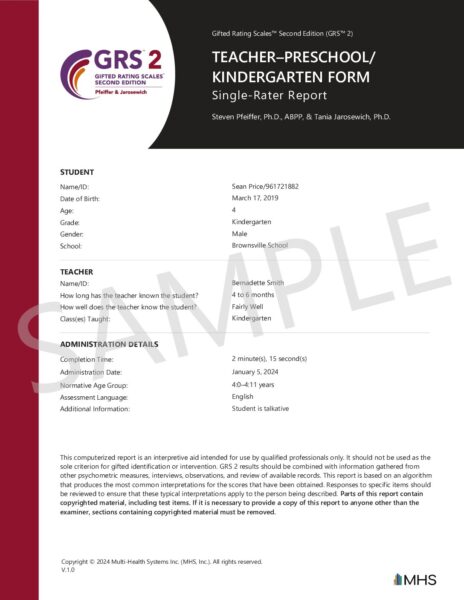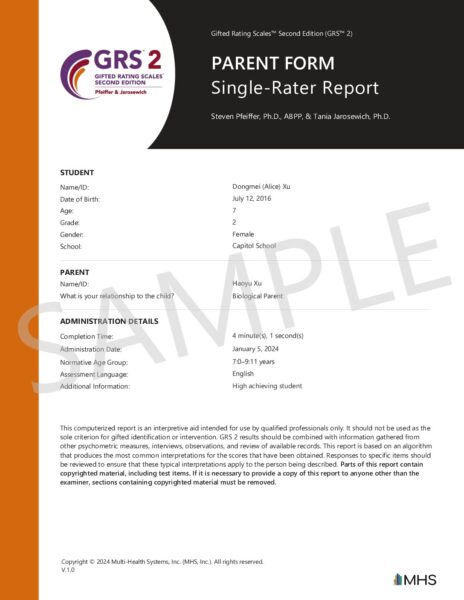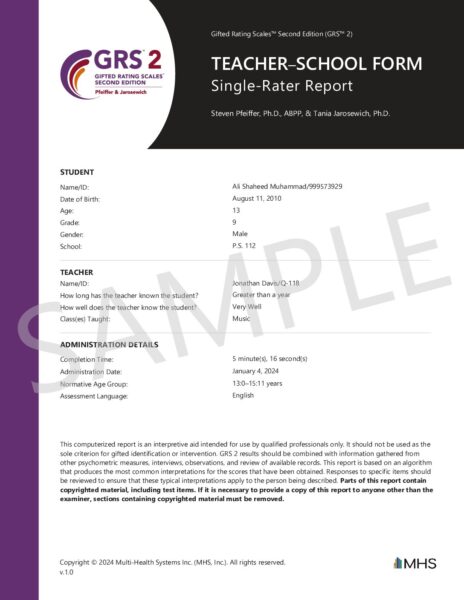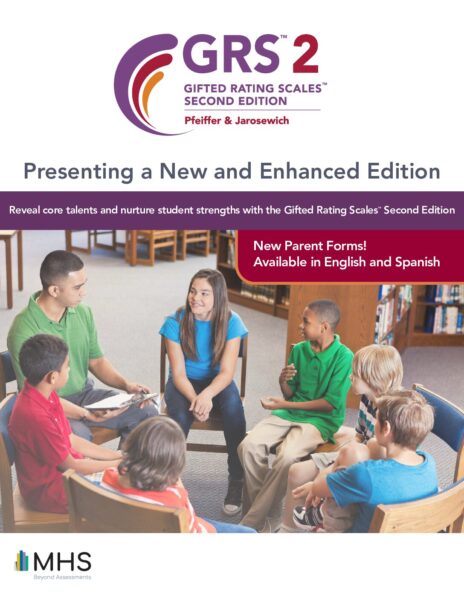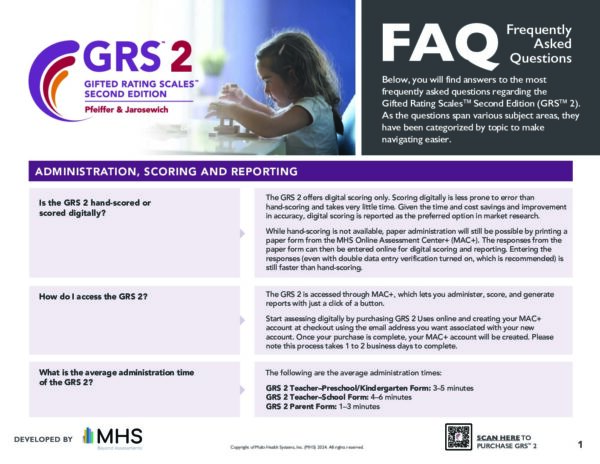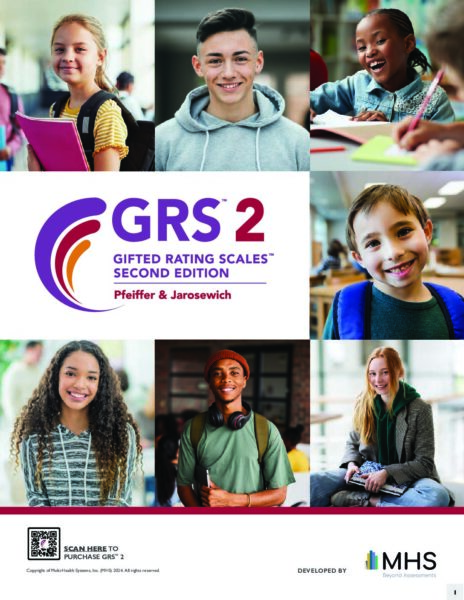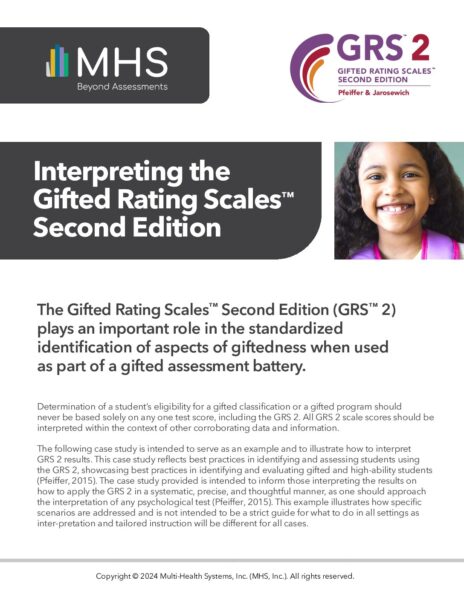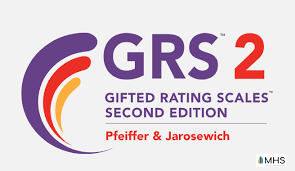
Gifted Rating Scales 2nd Edition [GRS-2]
A comprehensive tool that, in conjunction with other sources of information, aids in the identification of gifted and talented individuals
For Ages: 4 – 19 years
Administration Time: 2 – 5 minutes
Report Type: Teacher Preschool/Kindergarten, Teacher School, Parent
Administration & Scoring: Online via MHS Assessment Centre+ (MAC+) Online platform
Online Forms, Reports, Kits & e-Manuals
All online resources including Forms, Reports, i-Admins, Kits and e-Manuals.
GRS-2 Online Report (each)
The Gifted Rating Scales Second Edition (GRS™ 2) is a revision of the well-established Gifted Rating Scales (GRS). The GRS™ 2 incorporates many of the benefits of the original GRS but was carefully designed to offer enhanced functionality and accessibility. New features include:
• An expanded age range (4–18 years).
• Teacher Form updates with item revisions, a reduced number of items per scale, and updated norms.
• A new Parent Form gives users additional data points for Cognitive Ability, Creative/Artistic Ability, and Resiliency & Social Competency in the assessment process for gifted identification. The Parent Form enables ratings based on behaviours observed in different contexts, allowing for a more holistic view of students’ abilities.
• A new modular administration with the option to select which scales to administer.
• New modular reports with rater response-style indicators.
• Analyses of students’ relative strengths.
All GRS™ 2 users receive access to a free, digital version of the GRS™ 2 Manual through their MHS Online Assessment Center+ (MAC+) account.
Key Areas Measured
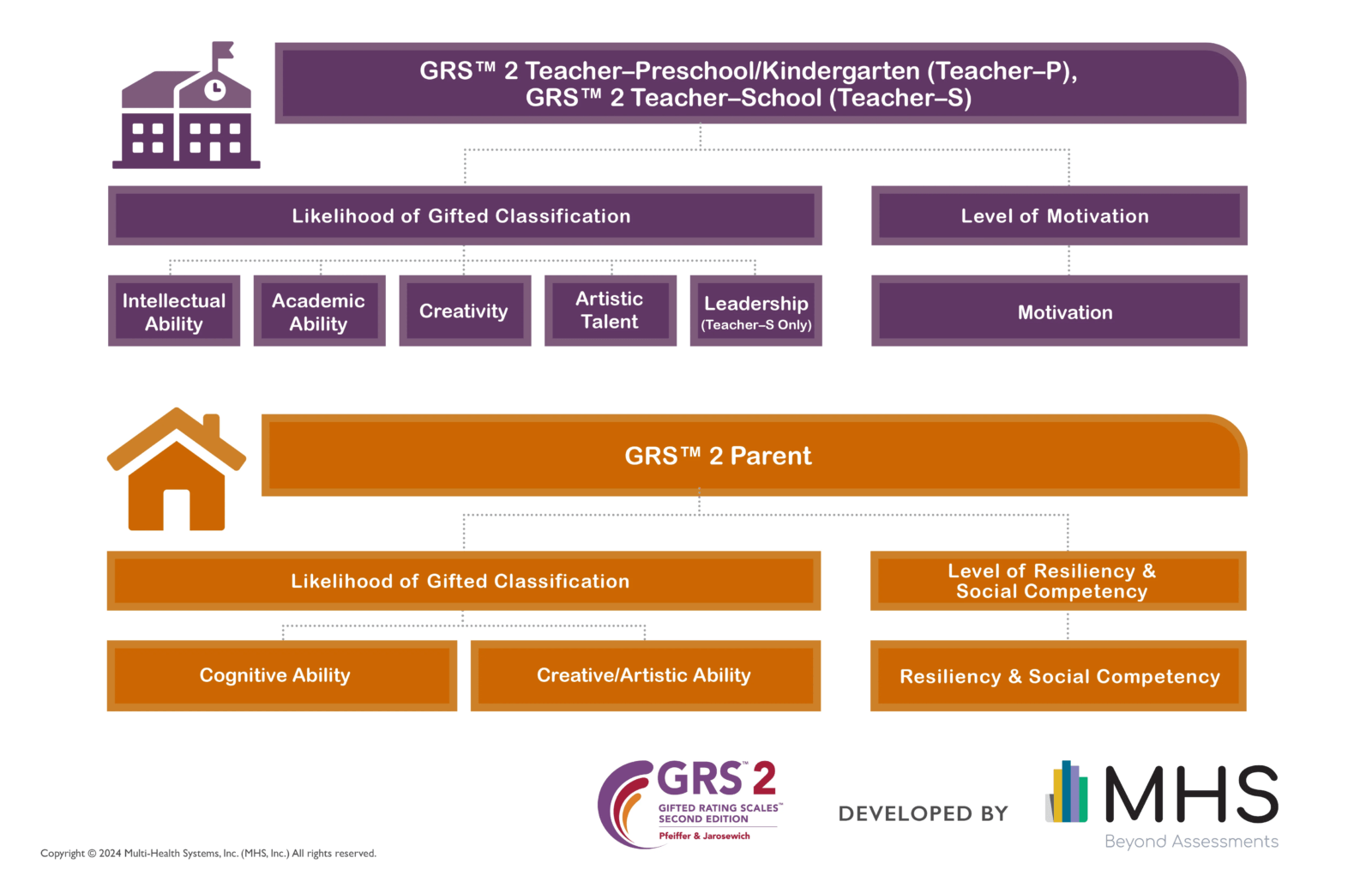
reports
Online scoring can generate two types of GRS 2 reports:
- Single-Rater Report—provides one student’s scored results from one rater.
- Scored Dataset—provides all students’ scores within a single spreadsheet.
Reliability
The GRS™ 2 Teacher–Preschool/Kindergarten Form (GRS 2 Teacher–P), GRS 2 Teacher–School Form (GRS 2 Teacher–S), and GRS 2 Parent Form (GRS 2 Parent) showed evidence of reliability through high internal consistency coefficients (e.g., median omega across age groups, raters, and scales within the Normative Samples: GRS 2 Teacher–P = .98, GRS 2 Teacher–S = .98, and GRS 2 Parent = .91); a high degree of test information, providing evidence for the precision of measurement; statistically significant (p < .001), strong to very strong, and positive test-retest correlation coefficients between scores across a 2- to 4-week interval (GRS 2 Teacher–P: corrected r = .66 to .80; GRS 2 Teacher–S: corrected r = .74 to .91, GRS 2 Parent: corrected r = .62 to .74); and statistically significant (p < .001) and strong inter-rater reliability between school-age teacher raters (corrected r = .65 to .76), and between parent raters (corrected r = .71 to .76).
Validity
The GRS™ 2 showed evidence of validity through confirmatory factor analyses (CFA) that provided evidence to support the structure of the GRS 2 scales (final models had strong fit statistics for all forms [CFI and TLI ≥ .923; SRMR ≤ .047; RMSEA ≤ .069] and replicated the structure of the original GRS™); meaningful differences between the General Population and the Gifted Samples, such that gifted students yielded higher scores than students from the general population (median Cohen’s d = 0.90 across all forms and scales), providing evidence of criterion-related validity; and evidence of convergent validity through strong associations between the Resiliency & Social Competency scale from the GRS 2 Parent and the Social Skills and Resiliency scales from the Behavior Assessment System for Children, Third Edition (BASC–3; Reynolds & Kamphaus, 2015; corrected r = .68 for both scales).
Fairness
Evidence of fairness was established through the absence of meaningful psychometric differences between demographic groups. There was no evidence of measurement bias due to the gender (maximum |ETSSD| = 0.07), race/ethnicity (maximum ETSSD = |0.07|), primary language spoken (maximum ETSSD = |0.27|), parental education level (PEL; maximum ETSSD = |0.04|), household income (maximum ETSSD = |0.06|), or country of residence (maximum ETSSD = |0.13|) of the student being rated.
Online administration in MHS Assessment Center + (MAC+)
Assessing online has never been easier with the new MHS Online Assessment Center +. Experience the new online platform designed with clinicians for clinicians to ensure the easiest, fastest and most accurate assessing possible!
Why use the GRS-2 online?
- Save time – fast, easy and accurate administration with automated scoring
- Assess and score from anywhere – enjoy the convenience of viewing reports from your home, office or anywhere with an online connection
- Improve efficiency and accuracy – when items are absent, prompts appear to ensure information is not missed
- User friendly – easy to use interface for practitioners and respondents
- Gain information easily – email a link to the form directly to the respondent
- Tailored organisation – data can be customized to how you work
- Benefit from significant cost savings – don’t purchase paper forms in bulk ever again
View the full list of assessments available in the MHS Online Assessment Center + here.
 NZ
NZ




